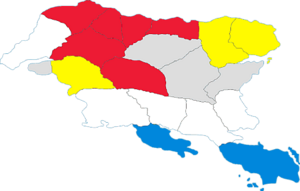Gylian federal election, 2004
| |||||||||||||||||||||||||||||||||||||||||||||||||
All 500 seats in the Chamber of Deputies 251 Chamber of Deputies seats seats needed for a majority | |||||||||||||||||||||||||||||||||||||||||||||||||
|---|---|---|---|---|---|---|---|---|---|---|---|---|---|---|---|---|---|---|---|---|---|---|---|---|---|---|---|---|---|---|---|---|---|---|---|---|---|---|---|---|---|---|---|---|---|---|---|---|---|
| Turnout | 94,5% | ||||||||||||||||||||||||||||||||||||||||||||||||
| |||||||||||||||||||||||||||||||||||||||||||||||||
 | |||||||||||||||||||||||||||||||||||||||||||||||||
| |||||||||||||||||||||||||||||||||||||||||||||||||
Federal elections were held in Gylias on 22 January 2004, to elect the 500 members of the Chamber of Deputies.
The incumbent Mathilde Vieira government was re-elected with minor changes in seats. The election set a record for least amount of seat changes in a Gylian federal election.
Electoral system
The Chamber of Deputies was elected through single transferable vote, using the Droop quota and 5-member circonscriptions, drawn by Elections Gylias based on regional populations.
Parties were not allowed to nominate more than one candidate per seat. Candidates were not allowed to serve in the Senate simultaneously.
Parties
Background
This was the first election held after the Gylian Parliament's term was reduced to 4 years, completing the synchronisation of the electoral cycle.
The Mathilde Vieira government was still a favourite for re-election owing to the good economy and the personal popularity of Mathilde Vieira, although opinion polls revealed that the public was becoming tired of the "liquid Parliament" era.
The Coastal Rally for Fishing Preservation was shut down for anti-constitutional activities in 2003, leaving the Party of Consumers for Freedom as the last right-wing populist "molehill party" standing in the election.
Campaign
The election featured one of the most sedate campaigns in living memory.
National Bloc leader Eiko Fujimura heavily emphasised a "time for change" message in her campaign, pointing out that the Liberal Union and Progressive Alliance had the same leaders for 16 years.
Results
In accordance with electoral law, the results were embargoed until the full counting and transfers were completed, and were released all at once on 24 January.
| Parties and blocs | Chamber of Deputies | |||||
|---|---|---|---|---|---|---|
| FPV | % | ± | Seats | ± | ||
| Non-inscrits and independents | 2.966.262 | 22,5% | 236 | |||
| Liberal Union | 2.794.878 | 21,2% | 70 | |||
| Progressive Alliance | 2.755.328 | 20,9% | 69 | |||
| National Bloc | 2.702.594 | 20,5% | 64 | |||
| Centre Group | 1.779.757 | 13,5% | 59 | |||
| Union for Freedom and Prosperity | 105.467 | 0,8% | 2 | |||
| Revolutionary Rally | 65.917 | 0,5% | 0 | |||
| Front for Renewal of Order and Society | 13.183 | 0,1% | 0 | |||
| Total | 13.183.387 | 100% | — | 500 | — | |
| Registered voters and turnout | 14.073.110 | 94,5% | ||||
Analysis
The election set a record for least seat changes in a federal election. Overall, the only change was the Progressive Alliance gaining a seat and the Centre Group losing one, and while there was slightly more change among Non-inscrits, their overall standing remained at 236 deputies.
Swings were among the lowest recorded since 1995, with the highest swing being 0,7% (for the Liberal Union, against the Centre Group), and the lowest being 0,1% (against the Revolutionary Rally and Front for Renewal of Order and Society).
Although the overall seats remained static, notable changes took place on the map. The PA once again won a plurality in all the northern regions, a feat not managed for 35 years. The National Bloc won a plurality in Nauras, ending its lengthy period of having its pluralities confined to Nerveiík-Iárus-Daláyk. The rest of the southern regions — Tomes, Ḑarna, Aðuna, and Herlan — all returned ties.
Aftermath
The new Parliament was sworn in on 1 February 2004, and the Mathilde Vieira government was returned to office.



